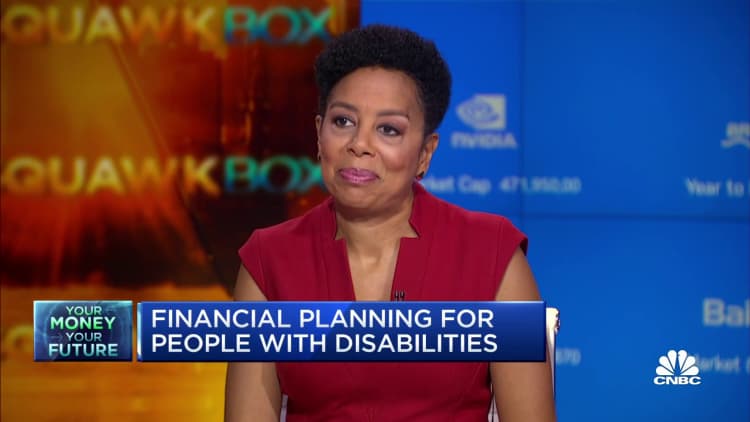Lucy Lambriex | DigitalVision | Getty Images
Despite the substantial elderly and disabled population in the United States, there is a severe lack of affordable housing to accommodate these individuals.
“For many Americans, having adequate housing is more of a dream than a reality,” said Senator Bob Casey, D-Pa., who serves as the chairman of the Senate Special Committee on Aging, at a hearing held on Thursday.
Casey added, “In particular, a significant number of older adults and people with disabilities cannot afford accessible housing.”
According to Casey, about 26% of the U.S. population, a staggering 61 million people, have a disability. At the same time, it is estimated that by 2030, 1 in 5 Americans will be over the age of 65.
Accessible homes, which are designed with specific features or technologies, can help older and disabled individuals continue living in their own homes or chosen communities. These features may include wider doorways, lower counters and sinks, and accessible bathrooms.
However, Casey pointed out that less than 5% of the national housing supply is considered accessible, and less than 1% is available for individuals who use wheelchairs.
More from Personal Finance:
Is raising taxes the answer to Social Security reform?
Medicare Part B premiums may increase due to Alzheimer’s med
Social Security phone disruptions have led to longer wait times
Leaders from both political parties agree that the shortage of adequate housing is a significant problem.
Senator Mike Braun, R-Ind., ranking member of the Senate aging committee, noted that the U.S. housing market is currently 3 to 6 million houses short of meeting the demand.
Braun highlighted that the problem is further complicated by state and federal regulatory burdens, higher infrastructure costs, supply chain constraints, workforce shortages, and increased materials costs due to inflation.
Braun stated, “Though we may have differing opinions on the solutions, there is always practical legislation that can be found in the middle. I hope that we can engage in conversations that bring us closer to those solutions.”
New suggestions for improving the situation emerged during the hearing held on Thursday.
Develop affordable, accessible housing
Dominique Howell, a disability housing advocate from Philadelphia, testified at the hearing about her struggle to find a suitable and affordable home that can accommodate her disability.
Howell shared that five years ago, she and her young daughter, along with her grandmother, were wrongfully evicted from their home. Initially, Howell was denied shelter due to the home- and community-based services she relies on. After obtaining legal representation, she was finally able to find shelter, but spent a year sleeping in her power wheelchair.
While Howell and her daughter have now found a home, it still presents accessibility challenges. When the elevator breaks down, they are sometimes confined to their homes for weeks.

“Housing is a basic human right, and unfortunately, many Americans, especially those with disabilities, are being denied equal access to affordable housing,” Howell emphasized.
To address this issue, Howell recommended that Pennsylvania and other states invest in developing affordable and accessible housing that meets the needs of residents.
Jenny Schuetz, a senior fellow at Brookings Metro, suggested that retrofitting older homes to improve accessibility could be one potential solution. However, she acknowledged that updating millions of homes would be an enormous task requiring both private and public capital.
Allie Cannington, senior manager of advocacy at The Kelsey, a disability-forward housing developer, emphasized the importance of making homes more affordable for the elderly and disabled populations.
Cannington stated, “For people with disabilities who rely on Supplemental Security Income and other federal assistance programs, there is currently no affordable housing market in the United States.” This issue affects over 4.8 million people with disabilities.
Encourage new housing construction
Schuetz pointed out that since the Great Recession, the United States has not constructed enough housing to keep up with job and population growth. Estimates suggest that the country needs an additional 3.8 million homes to fill the gap.
The effects are felt in local markets as well. According to Rick Wajda, chief executive of the Indiana Builders Association, Indiana requires 18,000 to 22,000 new houses annually to meet average demand. However, the state only reached those levels of production for the first time since 2007 in 2020.
Schuetz suggested that to reverse the trend of underbuilding, local governments should be provided with financial incentives to revise zoning laws and allow for more diverse kinds of structures.
Wajda also highlighted the need to relax regulations that lead to delays and increased building costs. Permit, hookup, and impact fees, as well as development and construction standards, often hinder development.
Restrictive building codes can add thousands of dollars to the cost of a house, further exacerbating affordability issues, Wajda noted.
“All regulations should be carefully examined to assess their impact on housing affordability,” he said.
In an effort to address the shortage of accessible and affordable housing for vulnerable populations, Senator Casey has put forward a bill that would require a percentage of homes built through the Low-Income Housing Tax Credit Program to meet accessibility standards.
Whether this proposal will garner the necessary support to become law remains to be seen.
–
Denial of responsibility! VigourTimes is an automatic aggregator of Global media. In each content, the hyperlink to the primary source is specified. All trademarks belong to their rightful owners, and all materials to their authors. For any complaint, please reach us at – [email protected]. We will take necessary action within 24 hours.


